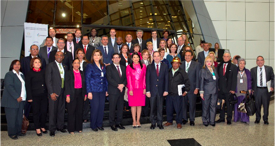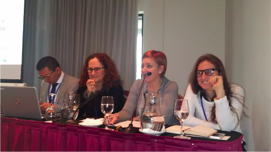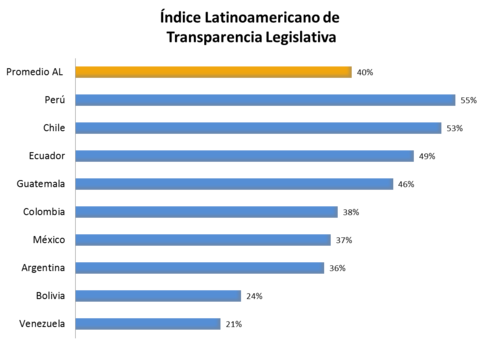Lo siguiente fue escrito por Natalia Albañil, Coordinadora del Programa de Transparencia Legislativa Regional, NDI Colombia.
En las últimas semanas se llevaron a cabo dos importantes eventos regionales en materia de Parlamento Abierto. El 25 y 26 de mayo en Asunción – Paraguay se realizó el primer encuentro anual de la Red de Parlamento Abierto de ParlAmericas, y el 31 de mayo, 1 y 2 de junio en Montevideo – Uruguay, el Encuentro Regional de la Alianza para el Gobierno Abierto (Open Government Partnership, OGP).
En el encuentro de ParlAmericas participaron 52 legisladores de 20 países de América: Antigua y Barbuda, Argentina, Bahamas, Bolivia, Canadá, Chile, Colombia, Costa Rica, Cuba, El Salvador, Guatemala, Honduras, México, Nicaragua, Panamá, Paraguay, Perú, República Dominicana, Santa Lucia y Venezuela. Durante los dos días de trabajo se compartieron experiencias exitosas en materia de Parlamento Abierto y los anfitriones presentaron su Primer Plan de Acción elaborado de manera conjunta con organizaciones de la sociedad civil.

El tema trascendental en la reunión de Asunción, además de socializar diversas experiencias, fue discutir la hoja de ruta para la apertura legislativa. Documento que busca ofrecer un marco de acción para que los parlamentos elaboren sus propios planes y/o iniciativas de Parlamento Abierto en torno a cuatro pilares: transparencia y acceso a la información pública, rendición de cuentas, participación ciudadana y probidad y ética parlamentaria.
El Encuentro Regional de OGP, aunque no giró exclusivamente entorno al tema de Parlamento Abierto si tuvo tres importantes espacios donde se compartieron experiencias y se recogieron valiosas opiniones. Durante la Desconferencia de las OSC se abrió una mesa de trabajo sobre Parlamento Abierto, donde el debate giró en torno al rol que juegan las OSC y cómo los mecanismos de transparencia y apertura, pueden ayudar a mejorar los niveles de confianza ciudadana en los Parlamentos.
Dentro de la agenda del Encuentro se abrieron dos paneles sobre los desafíos y avances de Parlamento Abierto en la región. El primero fue el organizado por ParlAmericas y la Red Latinoamericana de Transparencia Legislativa, en el cual participaron: el diputado chileno Patricio Vallespín, la Senadora de Costa Rica Karla Prendas, el investigador de FUNDAR, Guillermo Ávila y la Directora de la Organización Accesa de Costa Rica, María Fernanda Avendaño. El segundo panel, organizado por el Grupo de Trabajo sobre Apertura Legislativa (Legislative Openness Working Group, LOWG), contó con la participación de la Diputada de Argentina, Karina Banfi; el asesor principal del Presidente del Senado colombiano, Manuel Gómez, la Directora de la Fundación Directorio Legislativo de Argentina, María Barón y la Directora de la Organización Semillas para la Democracia de Paraguay, Marta Ferrara.

En dos estos paneles se expusieron diferentes aproximaciones que se han dado en la región a Planes de Acción de Parlamento Abierto. Costa Rica y Paraguay son ejemplos de trabajo participativo entre OSC y los Congresos nacionales. En Chile la elaboración de su Plan de Parlamento Abierto fue iniciativa de la Comisión Bicameral de Transparencia; en Colombia, la iniciativa nació del ejecutivo, pero fue desarrollado conjuntamente con las mesas directivas de ambas cámaras. Y en Argentina, aunque hasta el momento no hay un Plan concreto de Parlamento Abierto, la discusión que actualmente se lleva de la Ley de Acceso a la Información Pública y la importante labor de incidencia de las OSC argentinas permite vislumbrar significativos pasos para consolidar un grupo de legisladores interesados en esta materia y elaborar un futuro plan de acción.
Además de socializar las experiencias de Parlamento Abierto que hay en las Américas, estos espacios fueron positivos en la medida que se recogieron opiniones de diversos actores, tanto de la sociedad civil, los parlamentos y otras entidades gubernamentales, con el propósito de fortalecer las medidas de transparencia y apertura de los Congresos. Una de las principales conclusiones es la necesidad de institucionalizar las iniciativas de Parlamento Abierto, para que se mantengan en el tiempo y no dependan completamente de la voluntad política de las mesas directivas de turno; así como la necesidad de involucrar y capacitar a los equipos técnicos y administrativos de los Congresos, son ellos quienes tienen la responsabilidad de implementar cada uno los compromisos que se asumen.
Para la región es fundamental el desarrollo de estos encuentros, ya que permiten generar redes de apoyo e identificar buenas prácticas en la materia. El próximo evento que tendrá el continente será la Primera Hackathon Legislativa Mundial 2016, organizado conjuntamente por la Unión Interparlamentaria, el Instituto Nacional Demócrata, el HackerLab de la Cámara de Diputados de Brasil y la Cámara de Diputados de Chile. Personas de todo el mundo están invitadas a trabajar en temas legislativos y para ayudar a idear codificar, y co-crear soluciones digitales que contribuyan a una mejor comprensión de la labor legislativa, y además para involucrar a los ciudadanos en el proceso legislativo.

